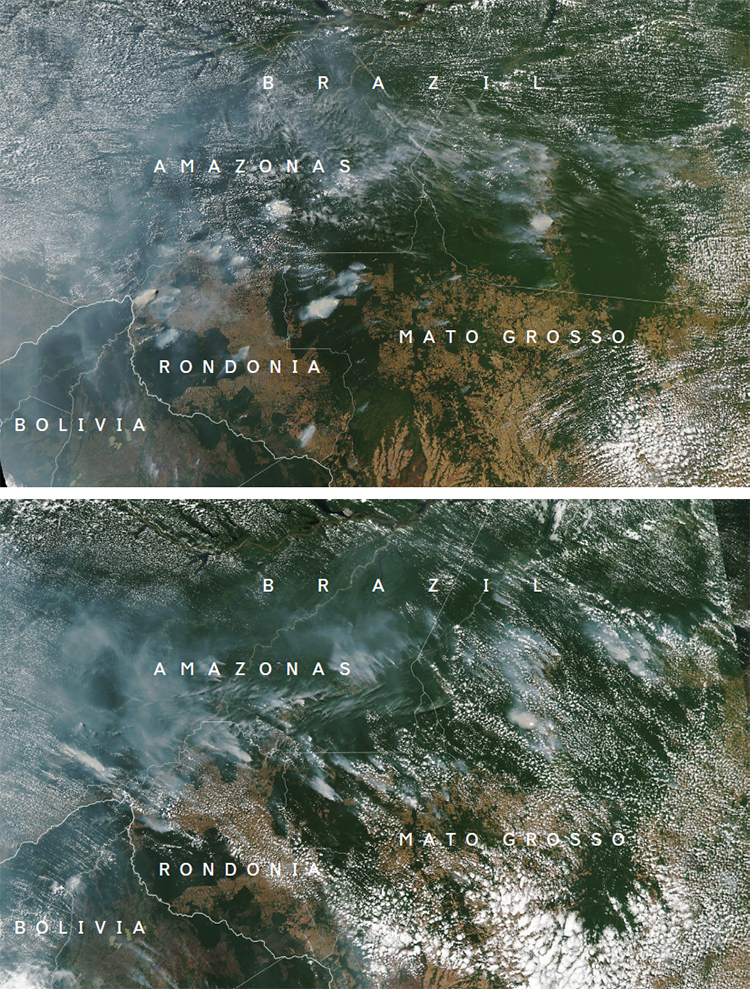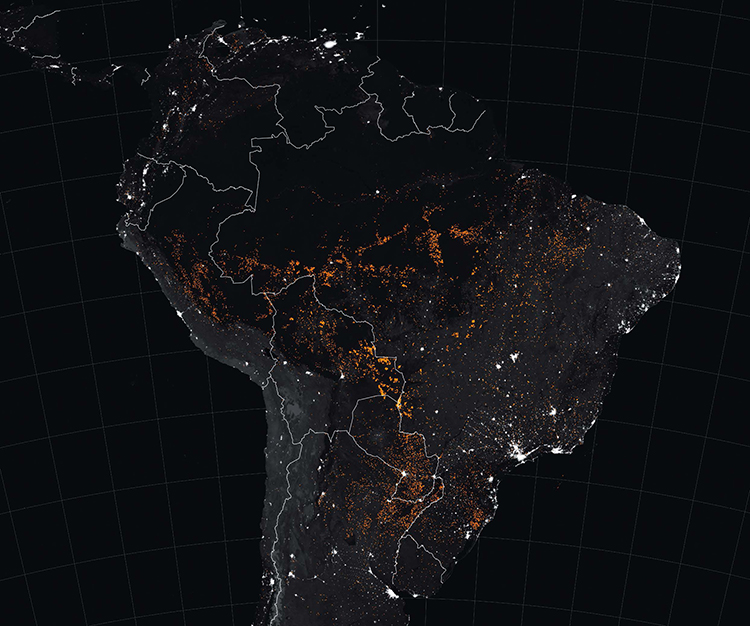The Amazon is on fire. We can do something. Although these are both truthful messages, they must be put into context.
Indeed, scientific data about fires has often been reported with inaccuracies with regard to both the percentage increase of Amazon deforestation compared to previous years (not 80% but 30-35%) and the weight the Amazon forest has on a global level in the production of oxygen (less than 10% and not 20% as often reported). Accurate data helps prevent falling prey of the empty and harmful sensationalism that is fuelling the polarising climate sought after by modern populist movements.
Fires must also be contextualised within the social and geopolitical panorama. Brazilian President Bolsonaro is actually pursuing national-populist arguments attempting to depict deforestation as an essential instrument for Brazil’s economic development. This appeals to the imagination of Bolsonaro supporters that now regard the Amazon Forest as a national goldmine that can make them wealthy.
However, although 60% of the Amazon rainforest is in Brazilian territory, it carries out important functions that go well beyond national boundaries. 5.5 square kilometres, inhabited by 500 indigenous groups, hosting 3 million plant and animal species and absorbing 2 billion tonnes of CO2 per year providing between 5 and 10% of oxygen at a global level. It is therefore a tool of paramount importance to curb the increase in global temperatures whilst offsetting human-induced emissions.
 |
|
The fire season hits the Amazon Forest. Moderate Resolution Imaging Spectroradiometer (MODIS) on NASA’s Aqua satellite captured images of several fires occurred in the states of Rondônia, Amazonas, Pará and Mato Grosso between the 11th (above) and 13th (below) August 2019. |
Yet Bolsonaro has repeatedly stated that he does not “believe” the climate is changing and that the forest belongs to all Brazilians. It is a harmful and short-sighted approach, based on false information. Science informs us that the climate is indeed changing, and investigations show that deforestation is definitely not benefitting the majority of Brazilians but only a handful of managers.
Fires in the Amazon are almost invariably caused by malicious human activity and are carried out by specialised people selling deforested land to livestock and agriculture farms such as AgroSB Agropecuária SA, which supply multinational corporations such as JBS. JBS SA is the world’s largest supplier of beef, chicken and skins, managing the slaughter (13 million animals killed every day) and shipping of end products, with 350,000 customers in over 150 countries and a $50 billion annual turnover.
It is no surprise that JBS sees the Amazon rainforest and deforestation of new areas as a quick and effective way to maximise its profits. Brazilian policies up to Bolsonaro tried to curb such expansionist ambitions by defining embargo areas where deforestation and pastures were not allowed. With the rise of the new President, who has very close ties with the top managers of Brazilian agribusinesses, everything has changed. In March, Bolsonaro’s ministers sacked Ricardo Galvão, Director of INPE (National Institute for Space Research) accusing him of lying about data regarding deforestation (scientific data reporting the actual increase of deforested areas since the beginning of the Bolsonaro administration) and appointed Ricardo Salles as Minister for Agriculture. Such political manoeuvres have had an immediate effect in the reduction of checks, sanctions and seizures, with a dramatic drop after the new President took office.
 |
|
The map shows active fires detected in Brazil and observed by Terra and Aqua satellites between the 15th and 22nd of August 2019. Fire locations were obtained by joining the night images acquired by Viris instrument (Visible Infrared Imaging Radiometer Suite), on the satellite Suomi National Polar-orbiting Partnership. Please note that fires detected in the states of Pará and Amazonas are concentrated in patches along the motorways BR-163 e BR-230, linking farmers from Southern Amazonia to a strategic harbour on the Amazon River in Santarém. |
Seizures and sanctions are essential to regulate a business such as the agro-industrial one, which in Brazil can cause irreversible damage to one of the world’s most important ecosystems. In 2017, for instance, Brazil’s Institute for the Environment and Renewable Natural Resources (IBAMA) discovered that JBS bought livestock from companies operating in “protected” areas where grazing was not allowed, fining the multinational $7.7 million. Still in 2017, J&F Investimentos, JBS’s major shareholder, accepted to pay a $3.2 billion fine, amongst he highest in history for a company, for its role in systematic corruption of government agents aimed at toppling President Temer’s administration.
An in-depth inquiry by the Investigative Bureau of Journalism and The Guardian shed some light on this and many other obscure aspects behind JBS, showing how JBS climbed up to the very top of the world’s agribusiness. Even ending up in Italian freezers. In 2018, Italy imported 13,500 tonnes of beef from JBS, ranking second in Europe, after the UK.
Yet solutions may also start here. A market does exist because meat from these areas is cheaper. Checks are there but are always carried out on the last company processing the meat. Therefore, it isn’t always easy to understand if a producer is responsible for illegal deforestation. What can we do? Reduce our consumption of red meat and eat local products as much as possible. We must understand the economic value behind our food consumption choices: paying less for a product that travels thousands of miles means paying more in the future in environmental and health terms.
Foundation for environmental education, www.fee.global
Il Post, “C’è un record di incendi in Amazzonia?”, 22nd August 2019, www.ilpost.it/2019/08/22/amazzonia-incendi
BBC, 28th August 2019, www.bbc.com/news/world-latin-america-49450925
S. Branford e T. Borges, “In Brazil, Jair Bolsonaro’s government is gutting environmental agencies from the inside”, Pacific Standard, 10th June 2019, https://psmag.com/environment/brazils-government-is-gutting-environmental-protections-from-the-inside
Investigative Bureau of Journalism, Revealed: How the global beef trade is destroying the Amazon, www.thebureauinvestigates.com/stories/2019-07-02/global-beef-trade-amazon-deforestation


